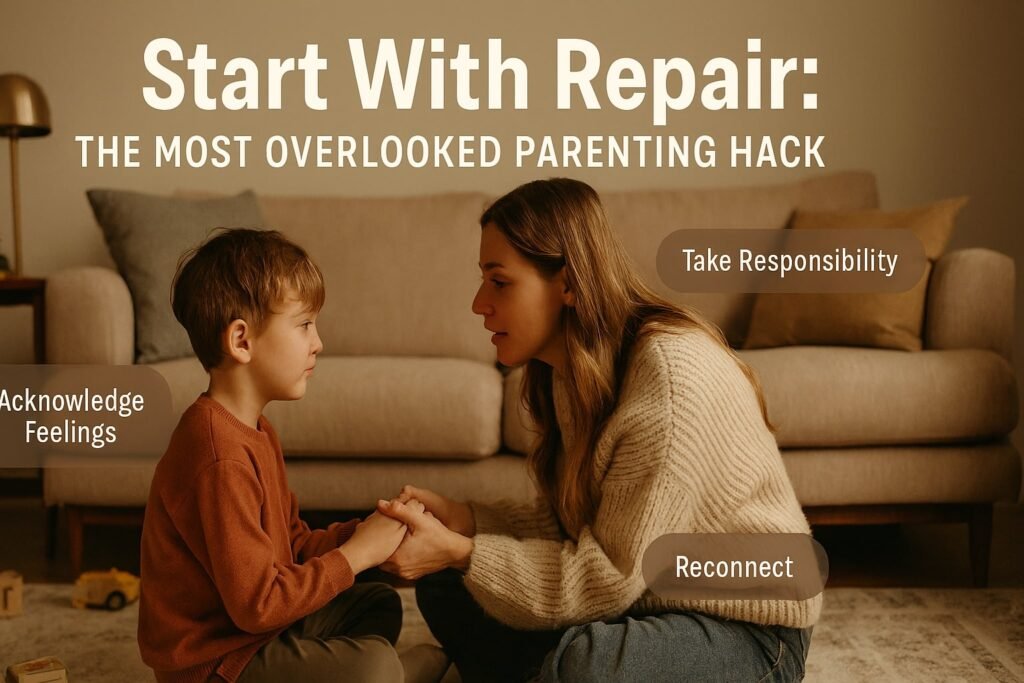Parenting today is both rewarding and stressful. Between work, school, and daily chores, many parents feel stretched thin. But raising kids does not have to be so overwhelming. The right tools and habits can save time, lower stress, and bring more joy to family life. Below are the best parenting hacks every parent should know. They are easy to use, backed by research, and practical for everyday life.
1. Start With Repair: The Most Overlooked Parenting Hack
Quick Answer: Repair means going back after a conflict, taking responsibility, and reconnecting with your child.
Every parent slips. You may yell, snap, or react too fast. The goal is not to be perfect. The real key is repair. Research in child psychology shows that when conflicts are left unresolved, kids often blame themselves. They may think, “I must be unlovable.” Over time, this can grow into anxiety or low self-worth.
Hack: After a fight, pause and own your role. Do three things:
- Name what happened.
- Take responsibility.
- Share how you’ll try again next time.

Example:
“I’m sorry I yelled. That must have felt scary. It wasn’t your fault. I’ll work on staying calm.”
This short 15-second act can shift a child’s story from fear to trust.
2. Stop Comparing, Start Understanding
Quick Answer: Every child is unique. Comparing hurts confidence. Understanding builds it.
Comparison is one of the easiest traps for parents. But no two kids are the same. Each child has their own gifts, talents, and pace. Some shine in sports, others in art, music, or schoolwork. Your job is not to mold them into what you want, but to guide them toward what excites them.
Hack: Notice your child’s natural spark. Cheer them on. If your child loves drawing, praise the effort. If they love soccer, encourage practice. Respect their path.
As poet Khalil Gibran wrote: “Your children are not your children. They come through you but not from you.”

3. Teach Emotional Language Early
Quick Answer: Give children words for feelings so they can manage emotions better.
Kids often act out because they cannot explain what they feel. If they have no words for anger, sadness, or fear, their only option is behavior. Teaching them feeling words gives them power.
Hack:
- Use simple phrases like: “I see you’re frustrated because the toy broke.”
- Model calm reactions.
- Encourage “I feel” statements: “I feel sad,” “I feel mad,” or “I feel left out.”
This small habit prevents shame and builds emotional intelligence. Over time, your child learns that feelings are normal and manageable.
4. Create a Value-Based Environment
Quick Answer: Surround your child with values, not just rules.
Children grow from what they see every day. The home shapes behavior more than commands. At Shree Swaminarayan Gurukul, three pillars guide learning: Vidya (Knowledge), Sadvidya (Values), and Brahmavidya (Spiritual Growth). Together, they create balance between school, morals, and inner peace.
Hack: Bring these pillars home:
- Vidya (Knowledge): Encourage questions and problem-solving.
- Sadvidya (Values): Teach honesty, respect, and empathy.
- Brahmavidya (Spiritual Growth): Try meditation, mindfulness, or reflection.
5. Prioritize Connection Over Perfection
Quick Answer: Kids don’t need perfect parents. They need connected ones.
Perfection is impossible, but love is always possible. Parenting experts note that children thrive when they feel secure—even in tough moments.
Hack:
- Spend 10–15 minutes in child-led play.
- Show affection through hugs or hand-holding.
- Validate feelings instead of brushing them aside.
These small acts build lifelong trust.
6. Practice Mindful Modeling
Quick Answer: Your behavior is the strongest parenting lesson.
Children copy what they see. If you shout, smoke, or complain, they may too. But if you model calm and healthy habits, they will learn by watching.
Hack:
- Eat balanced meals—remember, “we are what we eat.”
- Show calm conflict resolution.
- Practice gratitude and mindfulness.
Modeling works better than lectures.
7. Balance Education With Life Skills
Quick Answer: Education matters, but life skills matter too.
Many parents focus only on grades. But the real world needs more than test scores. Adaptability, problem-solving, and daily skills count as much as academics.
Hack:
- Teach saving and budgeting.
- Let kids help with cooking or chores.
- Encourage creative problem-solving.
This balance prepares children for a changing world.
8. Use Food and Habits as Invisible Parenting Tools
Quick Answer: What your family eats and how you live shapes your child’s mindset.
Research links diet to mood, focus, and behavior. Gurukul traditions encourage fresh vegetarian food for mindfulness and discipline.
Hack:
- Cook fresh meals whenever possible.
- Eat together to bond.
- Limit fast food and processed snacks.
Shared meals teach patience, gratitude, and family values.
What I Like About These Parenting Hacks
- Simple, practical, and research-backed.
- Strengthen emotional bonds, not just discipline.
- Blend modern psychology with timeless wisdom.
- Work across different age groups.
Areas for Improvement
- Value-based routines may feel hard for busy families.
- Repair talks take emotional maturity and practice.
- Cultural views may shape how hacks are used.
Quick Comparison Table: Parenting Approaches
| Parenting Approach | Focus | Long-Term Impact |
| Traditional | Obedience, discipline | Compliance, fear-based |
| Modern (Western) | Independence | Confidence, but sometimes self-centered |
| Value-Based (Gurukul) | Knowledge + Values | Balanced, resilient, grounded |
| Good Inside Approach | Connection + Repair | Emotional safety, strong relationships |
FAQ Section
Q1. What is the best parenting hack for discipline?
Repair after conflict. Admit mistakes, reconnect, and model calm communication.
Q2. How do I stop comparing my child to others?
Focus on your child’s strengths. Encourage their passions. Every child has unique gifts.
Q3. What role does food play in parenting?
Healthy meals shape habits, mood, and discipline. Eating together builds family connection.
Q4. Is it too late to repair my relationship with my teen?
No. It is never too late. Start with small, honest conversations.
Q5. How do I balance education and life skills?
Value both. Support academics, but also teach budgeting, cooking, and teamwork.
Q6. What’s the difference between an apology and repair?
An apology ends a conflict. Repair opens a conversation and builds trust.
Q7. Can spiritual practices help in parenting?
Yes. Reflection or meditation builds calm, empathy, and inner strength.
Conclusion
Parenting is not about being perfect. It is about being present and connected. Repair matters more than flawless behavior.
From Ronald Fairbairn’s insights on self-blame, to Khalil Gibran’s wisdom on independence, and from Good Inside’s modern tips to Shree Swaminarayan Gurukul’s values, one truth stands clear: parenting blends psychology, spirituality, and daily practice.
The best parenting hacks every parent should know are simple:
- Repair after conflict.
- Avoid comparisons.
- Model healthy values.
- Focus on connection.
Do these with consistency, and you will raise children who are resilient, loving, and grounded.
Author Bio
Written by a parenting researcher and content strategist with expertise in child psychology, education, and family well-being. Drawing from both modern clinical insights and value-based educational philosophies, the goal is to provide actionable, trustworthy advice for parents navigating the challenges of 21st-century parenting.
References
- Fairbairn, R. (1952). Psychoanalytic Studies of the Personality.
- Gibran, K. (1923). The Prophet.
- Beck, B. (2022). Good Inside: A Guide to Becoming the Parent You Want to Be.
- Shree Swaminarayan Gurukul Organization. Official curriculum and philosophy (Vidya, Sadvidya, Brahmavidya).
- American Psychological Association (APA) – Parenting and emotional development guidelines.


